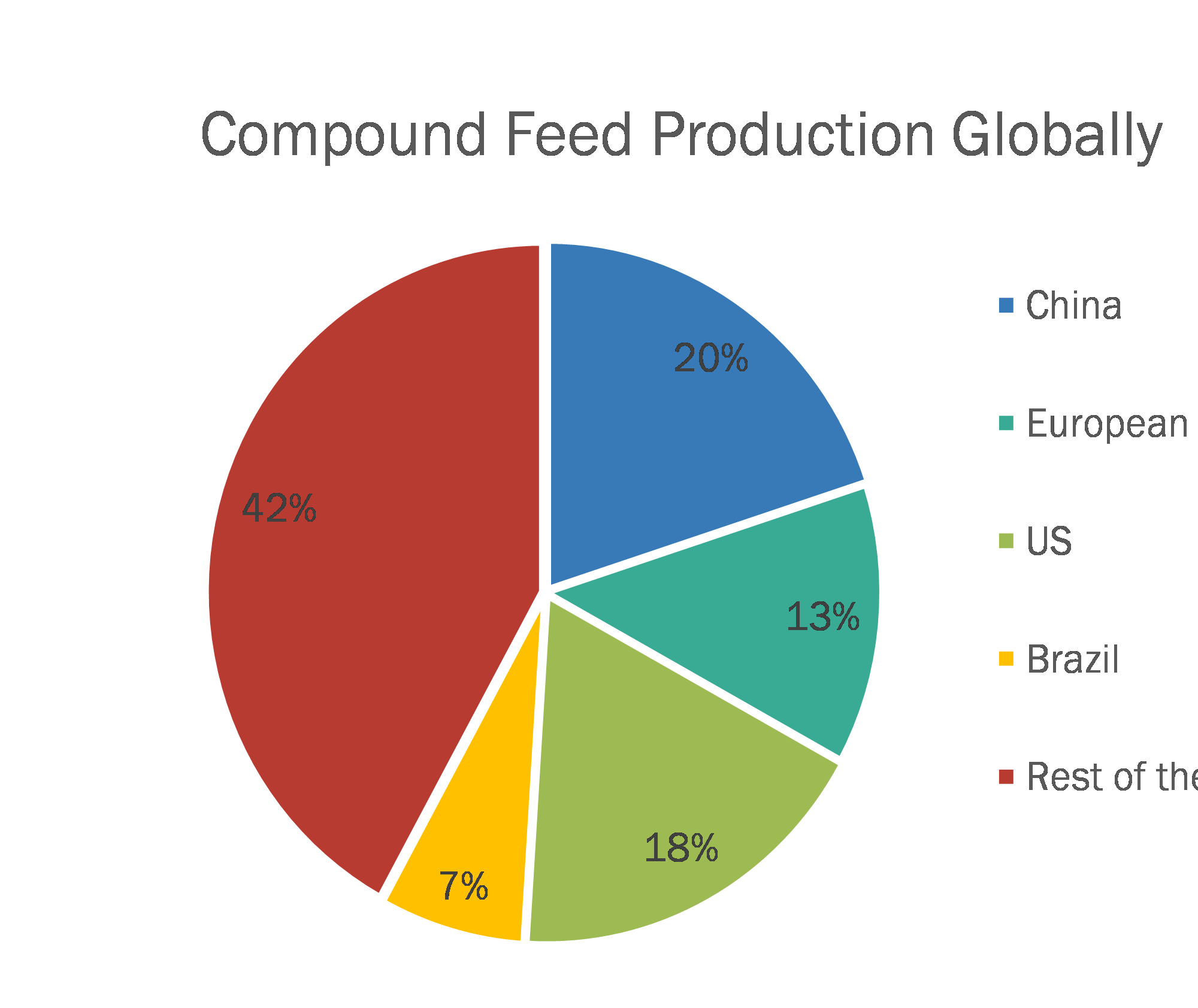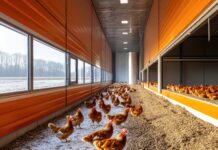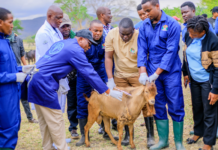By: Varjitha Gajapathy Ganapathy
Probiotics in animal feed serve a crucial role in promoting animal health and overall productivity. They help maintain a balanced and diverse gut microbiota, which is essential for proper digestion and absorption of nutrients. This, in turn, leads to improved feed efficiency and growth performance in livestock. Probiotics can enhance the immune system, making animals more resilient to various pathogens. This reduces the need for antibiotics, which is crucial in combatting antibiotic resistance. It contributes to the reduction of harmful environmental impacts by improving nutrient utilization, thereby decreasing the amount of waste produced by animals. This makes probiotics an important component in sustainable and responsible animal farming practices.

The Asia Pacific region, including China, plays a significant role in the probiotics for animal feed market. This is due to the region’s large and diverse livestock industry, which includes poultry, swine, aquaculture, and more. Probiotics are used in animal feed to promote gut health, improve digestion, and enhance overall animal performance. China, in particular, is a major player in this market, given its substantial livestock production. China is the world’s largest producer of animal feed. The country’s rapid economic growth and increasing demand for meat products have driven the expansion of its animal husbandry and livestock industries. This, in turn, has led to a substantial increase in the production of animal feed. According to the latest China Feed Industry Association (CFIA) report, China’s nationwide industrial feed production totaled 302.2 MMT in calendar year 2022, up 3% year-on-year. Pig and poultry feed production accounted for 45% and 40% of total feed production, respectively, compared with 45% and 41% a year prior. The country’s demand for probiotics in animal feed is driven by the need to optimize animal health and productivity in a sustainable manner.
The Asia Pacific region as a whole is witnessing a growing awareness of the benefits of probiotics in animal nutrition, along with an increasing focus on sustainable and eco-friendly farming practices. This has led to a rise in the adoption of probiotic supplements in animal feed formulations. Additionally, the Asia-Pacific region is home to several major probiotic manufacturers and suppliers. Countries like Japan, India, and China are global leaders in the production and export of probiotic products. This concentration of industry players in the region further cements its influence on the global probiotic in animal feed market. The global probiotics in animal feed market is on a growth trajectory, projected to reach USD 7.1 billion by 2028, as stated in the MarketsandMarkets report, “Probiotics in Animal Feed Market Global Forecast to 2028”. Within this market, the Asia Pacific region is estimated to contribute significantly, approximately 40% of the global market total by 2023. China stands out as a major player, making up approximately 57% of the Asia market and 23% of the global market by 2023.
The major players in the market include companies like ADM (US), International Flavors & Fragrances Inc. (US), CHR. Hansen Holding A/S (Denmark), Evonik Industries AG (Germany), Land O’Lakes (US), DSM (Netherlands), Ohly (Germany), Novozymes (Denmark), Alltech (US), Kemin Industries, Inc. (US), Provita Animal Health (UK), Orffa (Netherlands), Lesaffre (France) and Lallemand Inc. (Canada). And majority of these global players has their operations and sales network in Asia Pacific region.
Here are some prevalent trends in the probiotic in animal feed market:
- Integration of Prebiotics and Synbiotics: Prebiotics are non-digestible fibers that serve as food for beneficial gut bacteria, while synbiotics are a combination of prebiotics and probiotics. The integration of prebiotics and synbiotics with probiotics is a growing trend to enhance the effectiveness of microbial supplements in animal feed. The benefits of synbiotics include promoting a balanced and diverse gut microbiome, as well as generating short-chain fatty acids that contribute to a healthy gastrointestinal tract. Several studies have investigated the use of synbiotics in cats in conjunction with clindamycin, an antibiotic known to induce significant GI changes and distress in both pets and humans. In one trial, the use of a synbiotic with clindamycin in previously healthy cats illustrated synbiotics’ potential ability to mitigate some loss of beneficial bacteria. Additionally, the cats receiving the synbiotic also seemed to have altered levels of polyamine synthesis. Polyamines aid in the repair of the intestinal lining and have anti-inflammatory properties, so this is particularly interesting and will require more research to fully understand.
For instance, Pruex, a strategic partner of HeiQ Synbio, has been awarded the 2021 Agri-Tech Excellence Award for UK Innovation. Pruex specializes in helping farmers identify and address the sources of infections on their farms, facilitating changes in hygiene and husbandry practices. They are the exclusive partner of HeiQ Chrisal for farming in the UK. The application of synbiotics led to a significant reduction in moisture content in the chicken litter, resulting in a 50% decrease in the frequency of manure belt cleaning – from every three days to once a fortnight. This substantial reduction in labor requirements exceeded 75%. In addition to drying up the litter, the synbiotics lowered ammonia levels within the building and stored muck, enhancing air quality in the sheds and reducing the risk of disease-causing bacteria. Bird mortality was reduced by over 1%, and there was no need for antibiotics in the flock. The optimized egg production saved approximately GPD 12,000 per flock, while reduced feed requirements further contributed to cost savings without compromising production levels.
- Encapsulated Probiotics: Encapsulation involves coating probiotic microorganisms with a protective layer, which can enhance their survival in the harsh conditions of the digestive system. This technology allows for the targeted delivery of probiotics to the gut.
For instance, CanBiocin Inc. (Canada) patented microencapsulation technology provides a cutting-edge method for encapsulating live probiotic microorganisms. This process involves placing a protective coating around the probiotics, enhancing their stability, viability, and targeted delivery. CanBiocin’s technology allows for customizable formulations, meaning that all of their probiotic strains can be encapsulated to create tailored products that support various aspects of animal health, including gut health, immune function, and overall well-being. This flexibility enables the development of specialized formulations to meet specific needs in the animal industry.
- Natural and Sustainable Ingredients: There is a growing interest in using natural and sustainable ingredients in probiotic formulations, aligning with broader industry trends towards more environmentally friendly and ethical practices.
For instance, Veramaris and DHAgold offered by DSM (Netherlands), are innovative products that offer sustainable sources of essential nutrients for both aquaculture and livestock industries. These solutions are notable for their utilization of algae-based omega-3 oil, which presents a more eco-friendly alternative compared to traditional fish-based sources.
- Veramaris: Offering a sustainable and direct source of essential nutrients derived from algae. This reduces the pressure on wild fish populations, helping to preserve marine ecosystems.
- DHAgold: Approach eliminates the need to rely on fish-derived oils, which can contribute to overfishing and environmental degradation. By sourcing omega-3s directly from algae, DHAgold offers a more sustainable solution for enriching animal diets.
- Probiotics tailored/ customized for Pets: The market for probiotics tailored to pets was growing. Pet owners were increasingly seeking probiotic supplements and pet food with added beneficial bacteria for their furry companions. On August 30, 2021, CHR. Hansen introduced a range of stable live probiotics for pet foods and supplements.
- Hansen Pet-Prostart: Targeted at growing puppies, kittens, and their mothers during pregnancy and lactation.
- Hansen Pet-Proessentials: Designed for the essential needs during adulthood, supporting normal health and everyday well-being.
- Hansen Pet-Provital: Tailored for senior dogs and cats above 7 years of age.
This move caters to the increasing demand for natural and effective solutions from a new generation of pet owners. The probiotics was tailored for different life stages of dogs and cats.
The growth of the meat industry in developing economies such as India and China, as well as the increased consumption of quality meat products, are primary drivers for the Asian market. Augmented concern over livestock diseases and outbreaks of infections has further highlighted the importance of animal health and wellness to ensure the safety of end users. The advent of globalization and urbanization has caused a shift in consumer preferences, where consumers opt for nutritious, quality food products and like to experiment with food choices. These factors are expected to continue in the coming years, driving demand for probiotics in animal feed market. Key players in the industry focused on research and development to introduce innovative strains and delivery formats, further enhancing the market’s competitiveness.







